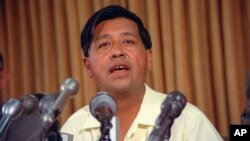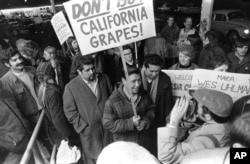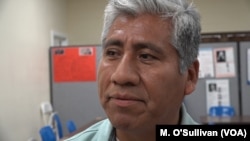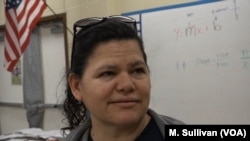Hispanic civil rights leader Cesar Chavez fought for the rights of itinerant farmworkers, many of them immigrants. He remains an inspiration for many, but for others, his legacy is complicated.
Chavez, who co-founded the United Farm Workers (UFW) union, died in 1993. He'll be remembered Saturday, March 31, on Cesar Chavez Day, which is a state holiday in California.
Symbol of Latino empowerment
Half of the vegetables, fruit and nuts grown in the United States come from California’s Central Valley, Chavez’s base of operations. At its height, the UFW claimed a membership of 70,000 in California, Florida, Washington, Texas and Arizona. Membership would later drop below 10,000.
Chavez, an advocate of nonviolence, has remained an international icon for his efforts to improve wages and working conditions for impoverished farmworkers, through strikes and boycotts of agricultural products. He also became a symbol of Latino empowerment.
In the 1960s, Chavez gained the support of key public figures, including Sen. Robert Kennedy, and was eventually embraced by the labor movement. A devout Roman Catholic, he was also admired by many Catholic bishops as he gained international fame.
A flawed figure
Miriam Pawel, author of The Crusades of Cesar Chavez: A Biography, said there was another side to the civil rights leader.
“He was very human,” she said. “He had a lot of flaws, and in some ways, he contributed to some of the union’s decline. But he was an enormously heroic figure whose achievements should be studied and celebrated.”
Among Chavez’s flaws, Pawel said, was he became increasingly autocratic in running his union after relocating in 1971 to a compound in the rural community of Keene, California, where he hoped to create a community that could translate his vision into action. President Barack Obama dedicated a national monument on the site in 2012.
WATCH: Cesar Chavez Day in California - Reflecting on Immigration
Chavez also had a mixed record in his dealings with undocumented workers — those who crossed the border illegally or stayed in the United States without authorization.
Today, between 50 and 70 percent of U.S. farmworkers are unauthorized, according to the American Farm Bureau Federation. Union officials say it’s the result of a system of labor recruitment that uses third-party contractors, and that few farmworkers today are unionized.
The UFW’s decline was largely the result of decisions made by Chavez, said Matthew Garcia, a history professor at Dartmouth College and author of From the Jaws of Victory: The Triumph and Tragedy of Cesar Chavez and the Farm Worker Movement.
Garcia recalls the efforts of Chavez’s cousin Manuel to create a vigilante line with UFW members near the Mexican border in Arizona, a so-called “wet line,” to block the entry of illegal migrants in the 1970s.
He said Chavez was a man of his times, not one who rose above them, and that he “saw undocumented workers as an impediment to organizing an effective union.”
Not so, said Chavez’s son Paul, a one-time UFW organizer, negotiator and lobbyist, and now chairman of the Cesar Chavez Foundation. He said his father was opposed to illegal strikebreakers, but accepted union members without the requirement that they be legal residents.
“It’s always been, ‘You represent who works in the fields.’ And so, no, there never has been and never will be” (the need for legal residency).
Lasting legacy
Today, nonprofit organizations inspired by Chavez support the undocumented, as well as legal immigrants, with housing, health care and education.
“I want to learn more English, and I want to get my high school diploma,” said Vilma Hernandez, a cafeteria worker and U.S. citizen who was born in El Salvador.
He's a student at an adult school in Bakersfield, California, which is sponsored by the Farmworker Institute for Education and Leadership Development.
Teacher Cesar Reveles said that other students are fearful. Immigration checkpoints in Bakersfield have targeted residents thought to be in the country illegally, “which makes them not want to come,” he said, or “not want to go out with their families, or be on the streets.”
Student Teresa Aguilar said she became a citizen after nearly 30 years in the country because of the current harsh enforcement of immigration law under President Donald Trump.
Samuel Santiago Santiago, a restaurant manager and part-time student, is worried about his brother and other relatives who are undocumented.
Aguilar worried about the young people brought to the United States as children who had a temporary reprieve from the threat of deportation under Obama’s Deferred Action for Childhood Arrivals program, which Trump has ended.
“The president or the Congress, they have to do something,” Aguilar said.
Congress and the president have been unable to craft an agreement. Trump blames the Democrats, and the Democrats blame Trump and a faction of Republicans who oppose the DACA program. Talks have been complicated by Trump’s insistence that the agreement include funding for a border wall.
Like much of the U.S. labor movement, the UFW and its allied organizations today support undocumented workers, especially DACA recipients.
Chavez’s life provides an example for activism, said David Villarino, Chavez’s former bodyguard who now heads the Farmworker Institute and is married to Chavez’s daughter Liz. He said the labor leader’s message was one of empowerment and change through nonviolent activism.
Pawel said Chavez showed “the poorest people that they could take on what was then the most powerful industry in the state of California and win contracts,” inspiring others to undertake collective action. But he had difficulty reconciling the “bureaucracy of the union with his vision of the movement,” she said.
Garcia noted that Chavez inspired others with the way he built “a multiethnic movement, a multigenerational movement,” employing the tactic of boycotts against agricultural products such as grapes and lettuce — a technique still used by labor and civil rights activists.















